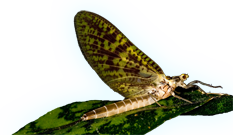Blog & Latest Updates
Fly Fishing Articles
Insects by Common Name

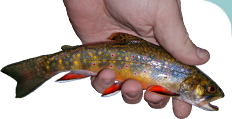
> > Hangman's Parasol
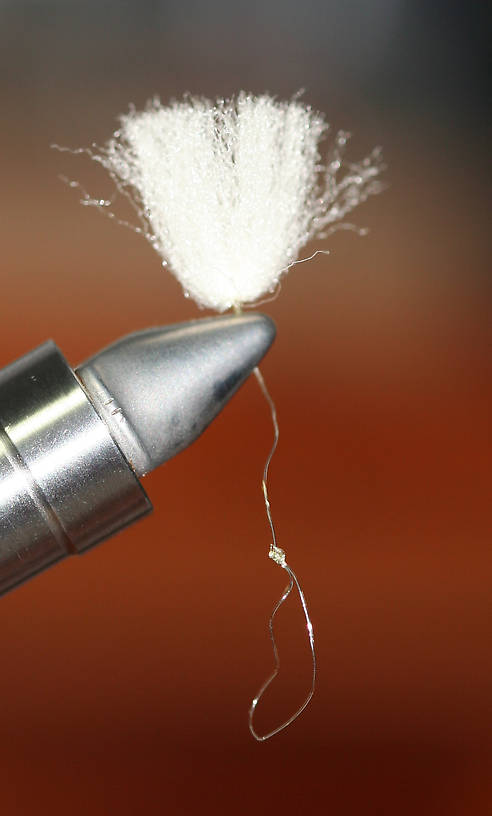
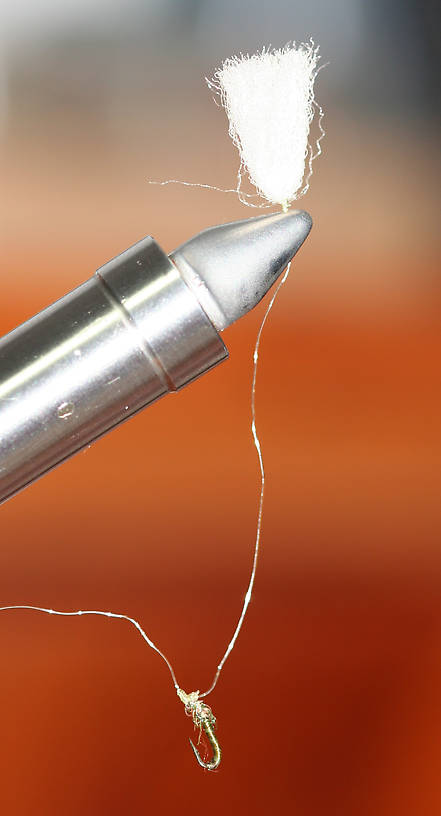
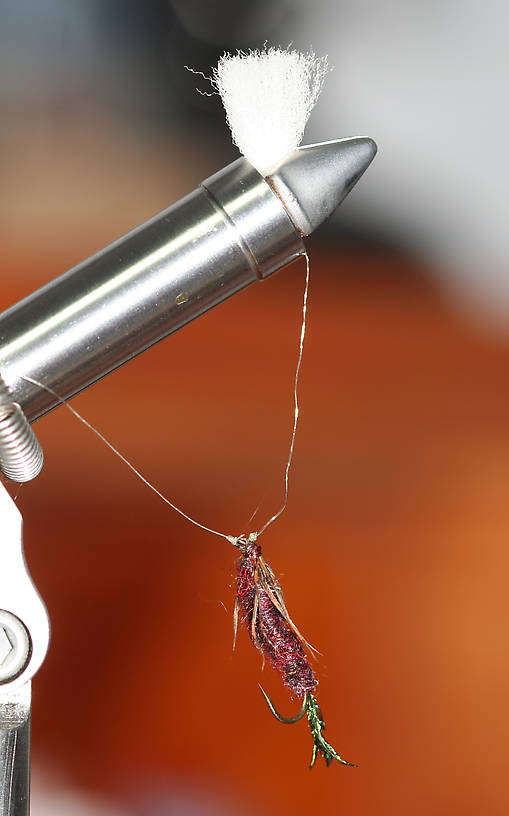
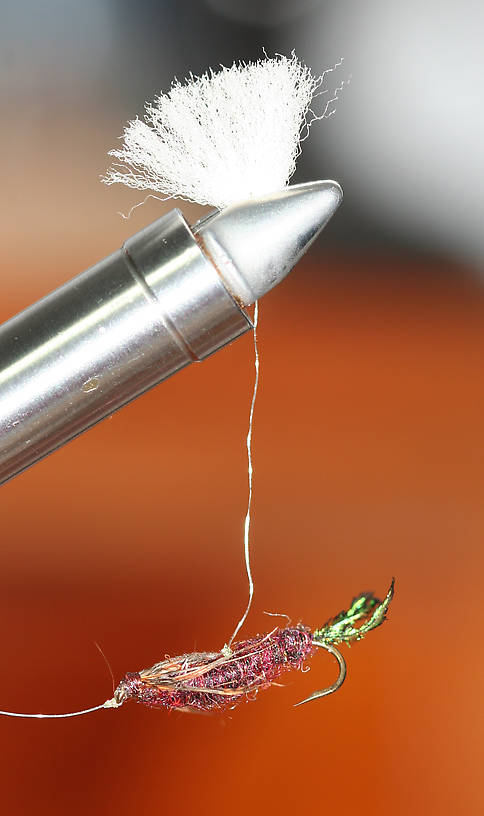
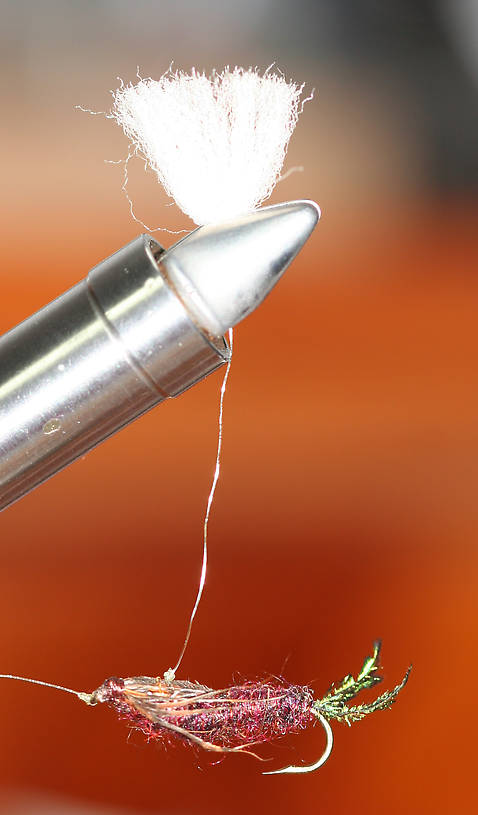
| Shawnny3 | July 25th, 2012, 12:12 pm | |
Moderator Pleasant Gap, PAPosts: 1197 | A few weeks ago I discovered the parasol style of tying (which I believe was first introduced by Fran Betters), the modern version of which employs a clinch knot to trap a tuft of poly yarn or some other good indicator material in a small section of mono. The tag end of the mono is then tied into the fly so that the fly hangs just below the water's surface. It struck me as an ingenious technique, but I didn't really want to go tying up a bunch of patterns in parasol variations. So I came up with a more versatile approach utilizing the same concept. Instead of tying the tag end into the fly, I tied a hangman's noose in it (I actually did this first, then dealt with the poly yarn afterward). That way, it can be slipped just in front of the fly or over the fly as a separate entity and can be used with any existing fly in your box. To take it off, just pinch the knot with between your fingernails and slip it back off again. This way you can make several parasol indicators of varying lengths or with larger or smaller tufts for different types of water so that you can sink any fly in your box to any depth you want. Instead of directly attaching the indicator to the fly, you could also place it behind any one of the knots in your leader. I've demonstrated in the photos how the same indicator (in this case about 2 inches long and tied with 5x) can be used on flies of very different types, a size-22 midge pupa and a size-10 isonychia nymph. I've also demonstrated how it can be attached to various places on the same fly to affect the fly's attitude in the water. A slip knot accomplishes the same goal as the hangman's noose and is much less bulky, but in my brief initial testing it failed much more easily than the hangman's noose when adjusted. The hangman's noose holds firm and is easy to put on and take off. Not a big fan of synthetic flotation, I'll probably make some of these with deer hair. I've not tested the rigging at all on fish yet, but I'm excited to try it out on some tricky fish. -Shawn | |
| Jewelry-Quality Artistic Salmon Flies, by Shawn Davis www.davisflydesigns.com | ||
| PaulRoberts | July 25th, 2012, 12:26 pm | |
| Colorado Posts: 1776 | Let us know how it works out. I love creative rigging ideas like this. | |
| Entoman | July 25th, 2012, 2:05 pm | |
| Northern CA & ID Posts: 2604 | Shawn, I think you are really on to something. If you move the indicator connection a little further down the hook shank, you also solve another problem besides keeping the fly in the zone. One of the biggest unaddressed issues with dead drift nymph presentations is the attitude of the fly. Not all hatching nymphs hang vertically. I've long suspected that fish can get selective to horizontal nymphs. It's been pretty much "game over" if they do. I'm not a big fan of the parasol nymphs that were in vogue for about two weeks on the West Coast almost a decade ago now. They went from a dozen patterns in The Fly Shop's catalog, down to a couple, and then totally disappeared in less than a year or two. The problem with them was that they were too obvious. At least that's what I suspect because the trout never explained why they didn't like them. Tippet twisters to the max as well. Your idea is a totally different approach!:) I agree with Paul that it's more of a rigging style than a nymph design and can be applied to any nymph in the box if the situation demands. Especially for those tough baetid emergences. I like! | |
| "It's not that I find fishing so important, it's just that I find all other endeavors of Man equally unimportant... And not nearly as much fun!" Robert Traver, Anatomy of a Fisherman | ||
| Entoman | July 25th, 2012, 2:10 pm | |
| Northern CA & ID Posts: 2604 | BTW -Not a big fan of synthetic flotation, I'll probably make some of these with deer hair... Yes, and an added benefit is you will increase the odds of getting strikes on the indicator.:) | |
| "It's not that I find fishing so important, it's just that I find all other endeavors of Man equally unimportant... And not nearly as much fun!" Robert Traver, Anatomy of a Fisherman | ||
| Crepuscular | July 26th, 2012, 9:24 am | |
| Boiling Springs, PA Posts: 923 | Cool Shawn, man if you made that indicator orange, the fish on the yellow breeches would eat it up! for some reason an orange wing post on a parachute tie, or an orange ball of strike idicator gets tons of takes. How about suspending a nymph from a dry via a similar connection? Did you try a uniloop? | |
| Martinlf | July 26th, 2012, 12:35 pm | |
Moderator Palmyra PAPosts: 3233 | Better put a hook in that indicator, Shawn. :) | |
| "He spread them a yard and a half. 'And every one that got away is this big.'" --Fred Chappell | ||
| PaulRoberts | July 26th, 2012, 1:06 pm | |
| Colorado Posts: 1776 | If you are a dry fly snob you must put a hook in the indicator, and remove the hook from the nymph. :) | |
| Entoman | July 26th, 2012, 2:13 pm | |
| Northern CA & ID Posts: 2604 | ...if you made that indicator orange, the fish on the yellow breeches would eat it up!... How about suspending a nymph from a dry via a similar connection? Did you try a uniloop? Good points, Eric. Shawn - Along the lines of Eric's comments, the following observations may have some merit. Indicators - They have always been a bit problematic as fish (usually little, but not always) will often take 'em and bigger fish may shy away because of them. Out West many of the larger sophisticated ones on our heavily fished rivers have had their fill of bright indicators and are put on the alert even if it is many feet away from the flies. I'm sure it's the same back East. When I use any indicator method on softer waters, I've gotten away from the bright colors for this reason. In shade, I prefer olive green Spring/Summer and a tannish color in the Fall/Winter (I found mine in a fabric shop that sells macrame yarn). In bright light, I prefer neutral gray if the fish are really spooky. It goes without saying to go with the smallest one that will still hold up the fly(s). I believe the giant gaudy puffballs of yore aren't as popular anymore for these reasons. Besides, they're a pain in the ... to cast.:) For example, the midge rigging you show could use one half that size or even smaller. Knots - There are smaller knots that are just as easy to adjust without being so obvious and are much easier to tie. In addition to the uni Eric mentioned, a double turle will slide very easily and will bury itself in the body. To loosen simply slip a needle in the loop. Not that strength is an issue, but it's a pretty strong knot as well. | |
| "It's not that I find fishing so important, it's just that I find all other endeavors of Man equally unimportant... And not nearly as much fun!" Robert Traver, Anatomy of a Fisherman | ||
| Troutnut | July 27th, 2012, 6:09 pm | |
Administrator Bellevue, WAPosts: 2737 | Very clever, Shawn! | |
| Jason Neuswanger, Ph.D. Troutnut and salmonid ecologist | ||
Quick Reply
You have to be logged in to post on the forum. It's this easy:
Related Discussions
| Title | Replies | Last Reply |
| Has this happened to anyone else?? In General Discussion by Aaron7_8 | 0 | |
| Re: Gander Mountain sales In General Discussion by Wbranch | 3 | Jul 28, 2017 by Wbranch |
| Re: Has this happened to anyone else?? In General Discussion by Aaron7_8 | 11 | Sep 16, 2008 by CaseyP |
| Re: I forgot how to tie on a sack of egg row (salmon) to a hook, can anyone help? In General Discussion by Dddhart | 2 | Oct 8, 2011 by Sayfu |
| Re: knots In Gear Talk by Sayfu | 11 | Aug 3, 2013 by Sayfu |
| Re: Looking for a leader formula... In Gear Talk by OldHasBeen | 6 | Jul 8, 2020 by Wbranch |
| Re: getting midges down In the True Fly Family Chironomidae by CaseyP | 9 | Jan 17, 2018 by Ummm |
| Re: Fishing emergers In General Discussion by Adirman | 1 | Aug 29, 2018 by Martinlf |
| Re: Deep water trout and insects. In General Discussion by Crooketarow | 1 | Jul 9, 2009 by Mike56 |
| Re: Eastern Sierras 2019 In Fishing Reports by Summer_doug | 2 | Apr 9, 2019 by Summer_doug |
Troutnut.com is copyright © 2004-2024 Jason
Neuswanger (email Jason). See my FAQ for information about use of my images.
 privacy policy
privacy policy
